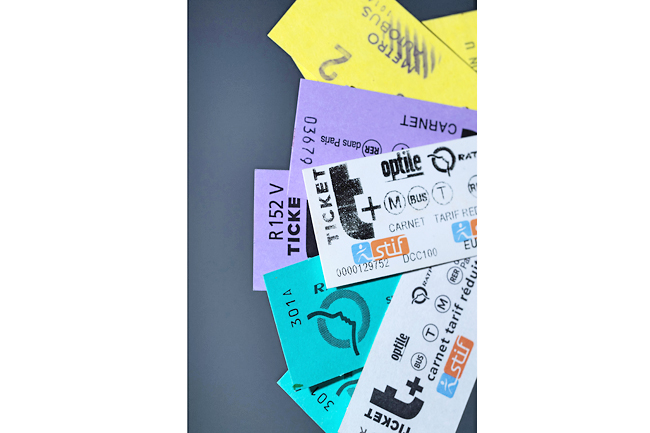Paris says goodbye to cardboard metro tickets
AFP – The Paris metro is phasing out cardboard tickets after 120 years, bringing the capital’s urban transport into a contactless future but leaving behind nostalgic fans who will miss the humble rectangular cards.
Beyond their intended use as a transport token, magnetic stripe tickets have inspired artists, filmmakers and singers, served as emergency notepads and above all as bookmarks.
“As the metro ticket disappears, part of our life also disappears,” said collector and author of a book on the history of the metro ticket Grégoire Thonnat. “The metro ticket is part of our image of Paris.”
Ile-de-France Mobilités, which operates the metro ticket office, had wanted the pack of 10 tickets called “carnets” to disappear in the first quarter of this year.
But then the Covid-19 pandemic broke out, and Russia’s war in Ukraine, and with it a global shortage of the microchips needed to make the smart cards to replace tickets – sales of which still total 550 million a year. , more than 50 tons of paper.
“We were in a hurry, but the chip crisis slowed us down,” said Ile-de-France Mobilités general manager Laurent Probst. AFP. The operator has started to reduce the number of stations that still sell carnets to push customers towards plastic cards, and many turnstiles can no longer read cardboard tickets.
As a result, the share of card tickets used in urban travel has fallen from over two-thirds a year ago to well under half today.
“Our customers are starting to change their habits,” Probst said.
He said the notebooks would disappear completely next year.
But, probably until 2024, travelers will still be able to buy single tickets for EUR 1.90 (USD 1.82), a markup from the EUR 1.49 a single journey costs when using a smart card. .
Ile-de-France Mobilités is moving forward with more modernisation, including the use of smartphones at turnstiles, with Android phones to be activated in a few weeks and Apple phones in 2023.
“I’m excited about this development,” Probst said. “This is a sea change in the quality of our customer service.”
Paris’ leap into the future comes 20 years after the New York Underground abolished metal tokens, and more than a decade after the London Underground went essentially paperless, but some are delighted that Paris has taken the things slowly.
“I appreciate its texture, I appreciate how clean the ticket itself is when it’s new, and how much you can destroy it and still have it,” said Italian-American artist Sarah Sturman in Paris, who uses metro tickets in his collage. work.
“I will continue to collect metro tickets until they are gone, and when they are gone they will be even more valuable,” she said. AFP.
“If I see a metro ticket in an album in 10 years, everything will come back: memories of being on the metro late at night, or at rush hour, my favorite metro line, or why I hate it another, losing the tickets, trying to sort my bag at the turnstile, doing the laundry and then finding your crumpled metro ticket in a pocket,” she said.
The metro ticket also has its place in popular culture, notably in singer-songwriter Serge Gainsbourg’s 1959 hit, Le Poinconneur des Lilas; as a keepsake for Yves Montand in the 1953 film Wages of Fear; and on the cover of the novel Zazie dans le métro by Raymond Queneau, which director Louis Malle adapted for the cinema in 1960.
“The lifespan of a ticket is an hour, or an hour and a half, and yet you get attached to it,” Thonnat said. “It’s quite irrational.”
“Metro ticket” is also the name of a style of pubic hair trimming that leaves only a strip the size of a ticket after waxing.
The cut, known in the United States as the “landing strip”, is the most popular among Parisiennes, according to a 2020 study published by Version Femina magazine.
Some tourists visiting Paris are looking forward to the day when they no longer have to decipher complicated metro ticket machines.
“I don’t like paper tickets, I want everything on my phone,” said Javier Romani, a visitor from Spain’s Catalonia region.
“I’m against paper tickets,” said Jeff Noel, of Indianapolis in the US state of Indiana.
“If you could do this electronically in your hotel room, it would be much easier than trying to find a machine.”
Stefania Grigoriadou, from Thessaloniki, Greece, said she preferred booking online but would keep the ticket she had purchased to go to the Disneyland Paris theme park.
“It’s good to have it in memory. Maybe we won’t come back to Paris, so we have something to show our kids in the future,” she said. AFP.


Comments are closed.